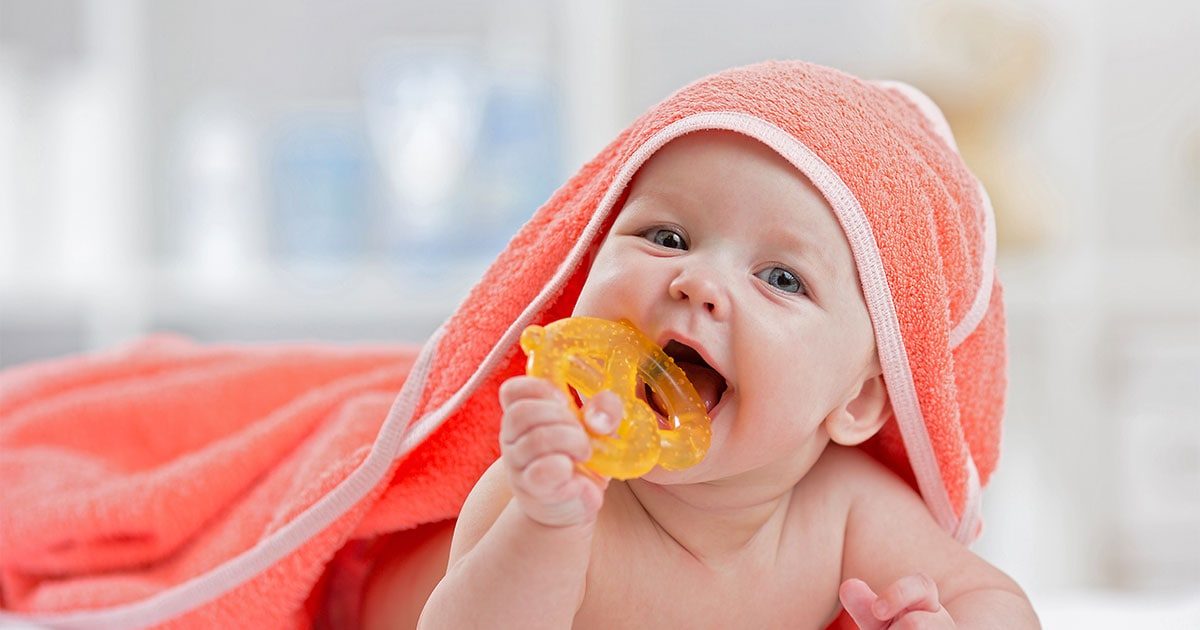If you have a young baby between the ages of 6 months to 2 years, it’s possible that their first teeth are starting to appear. Officially known as odontiasis, but most commonly known as “teething.” Teething is when an infant’s teeth first break through the gums and can also be referred to as “cutting” of the teeth.
Teething can be a stressful process for your baby, because when their teeth grow in, it can be painful! Since they don’t have the language to communicate with you at such an early age, it can be difficult to determine whether your baby is really teething or not. Luckily, there are many symptoms you can look for to know when your baby is getting their first tooth. You can also contact your pediatric dentist, like our lovely staff at ICTeeth, for more information on baby teething.
How do I know when my baby is teething?
You can often tell when a baby is at their teething age by a swollen or red appearance to the gums. “Blood blisters” are often seen over the area where the teeth are erupting. Of course, there’s more than just visual symptoms. Other signs of teething include:
- An increase in drooling
- A rash around the infant’s lips because of skin irritation, often because of excessive drooling
- Refusing to eat because gums are too sore
- Hands and fingers are often in or around the mouth
- Rubbing cheeks or ears because of associated pain from teething
- Loss of sleep because of gum discomfort
- Fussiness
Your child may not exhibit all of these symptoms, as the amount of pain from teeth cutting varies among children, but any or all of these signs can be indicative of a child’s teeth growing in.
Can teething cause other illnesses?
The short answer: No. Your infant’s first set of teeth should not cause other illnesses. If your baby is experiencing:
- A high fever
- A runny nose and cough
- Diarrhea
- Vomiting
- Irritability and fussiness
- Rashes
You shouldn’t assume it’s from teething. If any of these symptoms occur, you should take your child to see a doctor and administer the proper medications.
How do I relieve my baby’s pain?
Parents have invented many home remedies to relieve a child’s pain in their gums. Many doctors and dentists recommend rubbing your child’s gums with your clean fingers, or letting your child gently chew on a washcloth.
Many children also prefer cold objects, like toys or teething rings you can place in the freezer, to soothe their aches. You can even freeze washcloths for them to chew for comfort. Just be sure that any item you give to your infant is clean and is not a choking hazard.
Over-the-counter medication such as acetaminophen or ibuprofen are also effective in lessening a baby’s teething aches and pains. However, you should not give these medications to any babies under six months of age. These medications should also only be used when instructed by a doctor and when other methods do not work for your baby.
How do I keep up my baby’s oral hygiene?
Before your child’s first set of teeth starts to come in, you should regularly wash their gums with a clean, damp washcloth or soft infant toothbrush twice a day. This can prevent harmful bacteria from accumulating in their mouth.
When a baby’s first teeth start to cut, you will be able to use a small amount of non-fluoride toothpaste on their toothbrush to protect against cavities and gum disease. Again, professional dentists always recommend brushing at least twice a day, or after every meal. After your child reaches two or three years of age, when they learn to spit, they will be able to safely use fluoride toothpaste.
You should start bringing your child for dentist appointments as soon as they cut their first tooth, or at least by their first birthday.
Schedule an appointment today!
Watching your child grow up can be exciting, yet scary—especially when it comes to doctor’s appointments. Your child deserves the best pediatric dentist in the business. Contact us to schedule a first dental visit for your baby.

